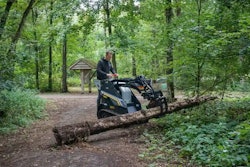During the Labor Day weekend I had the opportunity to see Spike Lee’s HBO documentary “When the Levees Broke,” about the disaster that hit New Orleans after Hurricane Katrina. It’s obvious Katrina exposed a failure in leadership at the top levels of government: city, state and federal. And while Spike Lee didn’t ask the question, it’s worth asking how this country creates leaders – what skills and training does it take to get to the top levels of the government?
Whatever the path to government leadership is today, it does not appear to be working. Where are the men and women who can take initiative, slash red tape, attack problems and deliver results? Today it seems more likely you’ll find people like this in business, especially businesses like construction where the challenges are big and the hours long. Nothing so concentrates the mind as overtime penalties on a multimillion-dollar project – when it’s your money on the table.
The difference between the way the government handles a disaster and how contractors respond was made clear to me this summer when I spent a week in Gulfport, Mississippi, rebuilding hurricane-damaged homes with a group of teenagers organized by our local churches. In Gulfport we joined forces with a well-run army of construction volunteers organized by the North Carolina Baptist Mens’ Association.
When I first walked into their converted National Guard armory the place was almost deserted. The volunteer cooks had come in hours before first light to prepare breakfast, and by 6:30 a.m. most of the crews were fed and gone. There to pick up supplies, I was directed to the back of the building where a spry, grandmotherly woman asked, “What can we get for you today?” Behind the building were rows of trailers that had been stocked with every imaginable building material. Sign on the dotted line, back up your truck, load what you need and go. It was like Home Depot in heaven.
With the exception of one high school history teacher, the adult supervisors I worked with in Biloxi, Mississippi, that week were all contractors and skilled tradespeople. They’d given up a week of their time – a week of vacation – to come do this. Later I learned NCBMA was set up to house, feed and coordinate up to 400 volunteers at a time. They’ve pledged to rebuild 600 homes within two years and have finished 265 already. Their non-construction volunteers have served more than 442,683 meals, provided more than 84,838 showers, and washed more than 7,082 loads of laundry. Meanwhile just a few miles away in a big field, thousands of empty FEMA-bought trailers were sinking into the soft, soggy clay of lower Mississippi – unused owing to some government technicality.
But what most impressed me about the week I spent in Biloxi was the effect it had on my daughter Holly, age 16. She overcame her fear of heights and wound up on a roof pounding down shingles like a pro. A lot of people complain about kids today. But give them a challenge, good organization, good supervision and a mission – the same environment you see in construction companies every day – and they’ll swing for the fences. Despite the heat, hard work and fetid living conditions among throngs of teenagers, she told me later it had been the best week of her life.
If you have the opportunity I urge you to put together a crew of your own and spend a week in Biloxi. You can sign up for the NCBMA project at the Web site below, or check with any church about other opportunities. I saw plenty of need for equipment operations, especially slab demolition and clean up.
If you go, put some teenagers, maybe a teacher or two and somebody from the government on your crew. Tell them it’s leadership training. And tell them it could very well turn out to be the best week of their life.








